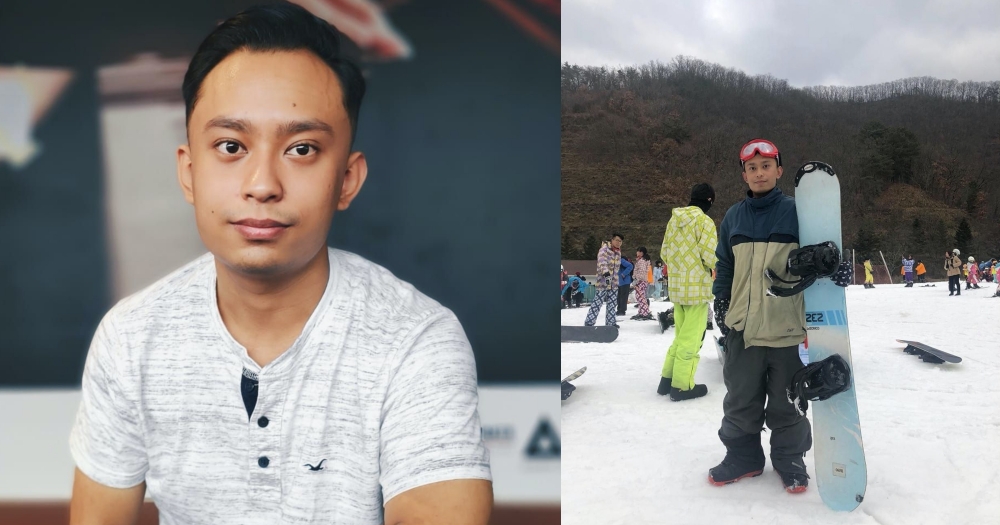The first time I met Ageng Setiyawan was in 2013.
It was Hari Raya and my brother had invited some of his friends over.
Ageng caught my attention as soon as he arrived.
He was slightly aloof and awkward.
He barely uttered a word and was staring into blank space the entire time.
It was only after he left that my brother told me he was partially blind.
Over the years, I've crossed paths with Ageng many times.
He was around during important festivities. And he was always the same quiet and expressionless guy each time he came over.
But that laidback demeanour conceals eight really challenging years he has had in his life thus far.
Diagnosed with Leber hereditary optic neuropathy
Ageng wasn't born with his disability.
He was 15 when he was diagnosed with Leber hereditary optic neuropathy (LHON), a visual condition that causes the blurring and clouding of one's central vision.
Before he was diagnosed, Ageng could see everything clearly.
"Now, I cannot focus on anything in my central vision. Everything is blurry. Most of the time, I just try to use my peripheral vision to make things out."
He now has to position himself a few centimetres away from something before he can see it, like when using his phone.
He also zooms in on every single word, number and picture to be able to see what it is.
Like this:
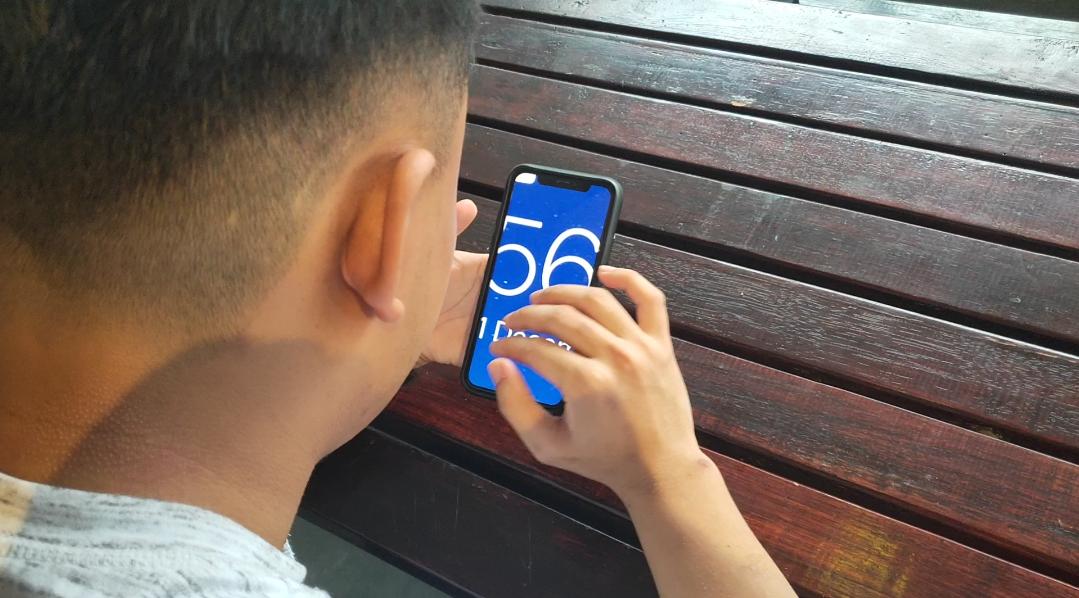 Photo by Syahindah Ishak.
Photo by Syahindah Ishak.
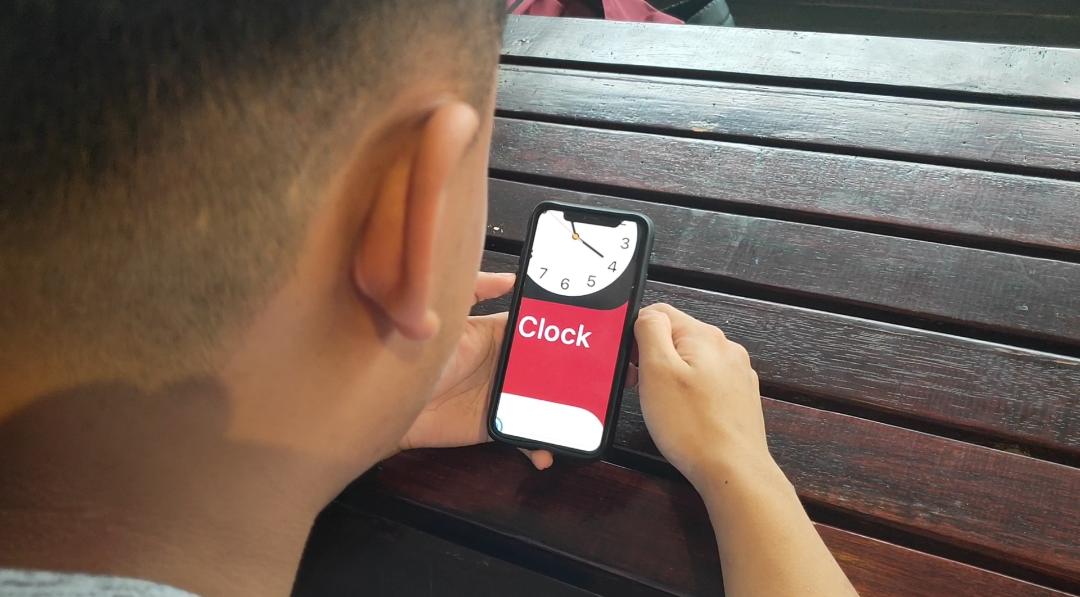 Photo by Syahindah Ishak.
Photo by Syahindah Ishak.
Surprisingly, Ageng tells me one of the biggest misconceptions people have towards people with blindness or visual impairment is that their other senses are heightened.
"It's a myth. I don't think my other senses got better. I just paid more attention to it.
Same goes for everyone, whether you can see or not. You just need to pay more attention to your senses."
In most cases, symptoms of LHON begin with one eye first, followed by visual failure in the other.
For Ageng, his left eye's vision went blurry and cloudy first.
He tells me he thought nothing of it at that time.
But after a while, his right eye began experiencing the same problems.
That was when he consulted a doctor and found out about his eye condition.
Ageng tells me there's no cure for the disease.
In most cases, vision loss is permanent and there's nothing that can be done to stop or slow it.
The tragic news greatly affected his family.
"My mother was the most affected. She was very sad and she cried at the hospital."
What about him, though? "I didn't really feel anything," he says.
Has trouble finding his way around Singapore
Ageng's condition, however, made even the easiest activities most of us take for granted an uphill battle for him.
Take going out, for instance — he says he has gotten lost around Singapore a number of times.
Once, he ended up in Hougang after boarding the wrong bus when he was trying to get home (in Pasir Ris).
Telling himself not to panic, Ageng used his phone to search for the right way back home. And he eventually found himself at another bus stop, and boarded the right bus.
Despite experiences like this, Ageng says he still likes going out alone.
"I never feel scared when going out. I'm just going out."
But yes, taking the bus can be quite challenging for him.
He can vaguely make out when buses are approaching, but bus numbers can be quite tricky.
To overcome this, Ageng estimates when his bus is arriving by checking approximate arrival times on a bus app on his phone.
He says he has memorised the bus routes he regularly uses and can usually tell where he is by the turns the bus takes.
Well, that and Google Maps.
Trains are easier, he tells me, because he can just listen to the announcements to know which station he is at.
Getting judged and feeling left out
One might wonder, in light of all this, why Ageng doesn't just ask people for help to make his life easier.
Unfortunately, from his experience, that hasn't been easy for him either — often having to deal with judging or weird looks from strangers whom he approaches for assistance.
"People always pity me. But I think they shouldn't do that. Their sympathy means that they think there's something wrong with me."
The prejudice against him is also the reason why he refuses to use a white cane, which people with vision loss or blindness often use as an aid in movement.
"When people look at me, they won't think I'm blind or something. So it's better that way. They can treat me normally."
He says quite honestly also that even his friends discriminate against him without realising it.
"They sometimes assume that I cannot do anything, and because of that, they won't invite me to go out with them."
He has missed gatherings with friends because they assumed he wouldn't be able to join them in watching movies, cycling or playing video games.
But the truth is, Ageng's blindness doesn't stop him from doing any of those things.
In fact, he watched "Avengers: Endgame" in the cinema with my brother last year.
He can only sit in the middle row of the cinema, though — those seats give him the best view.
At home, he sits about an inch in front of his television screen.
But there is one thing he wishes he could do that he probably won't ever be able to, by today's technology and standards.
"I always wanted to drive. But I'm not allowed to. I wish I can."
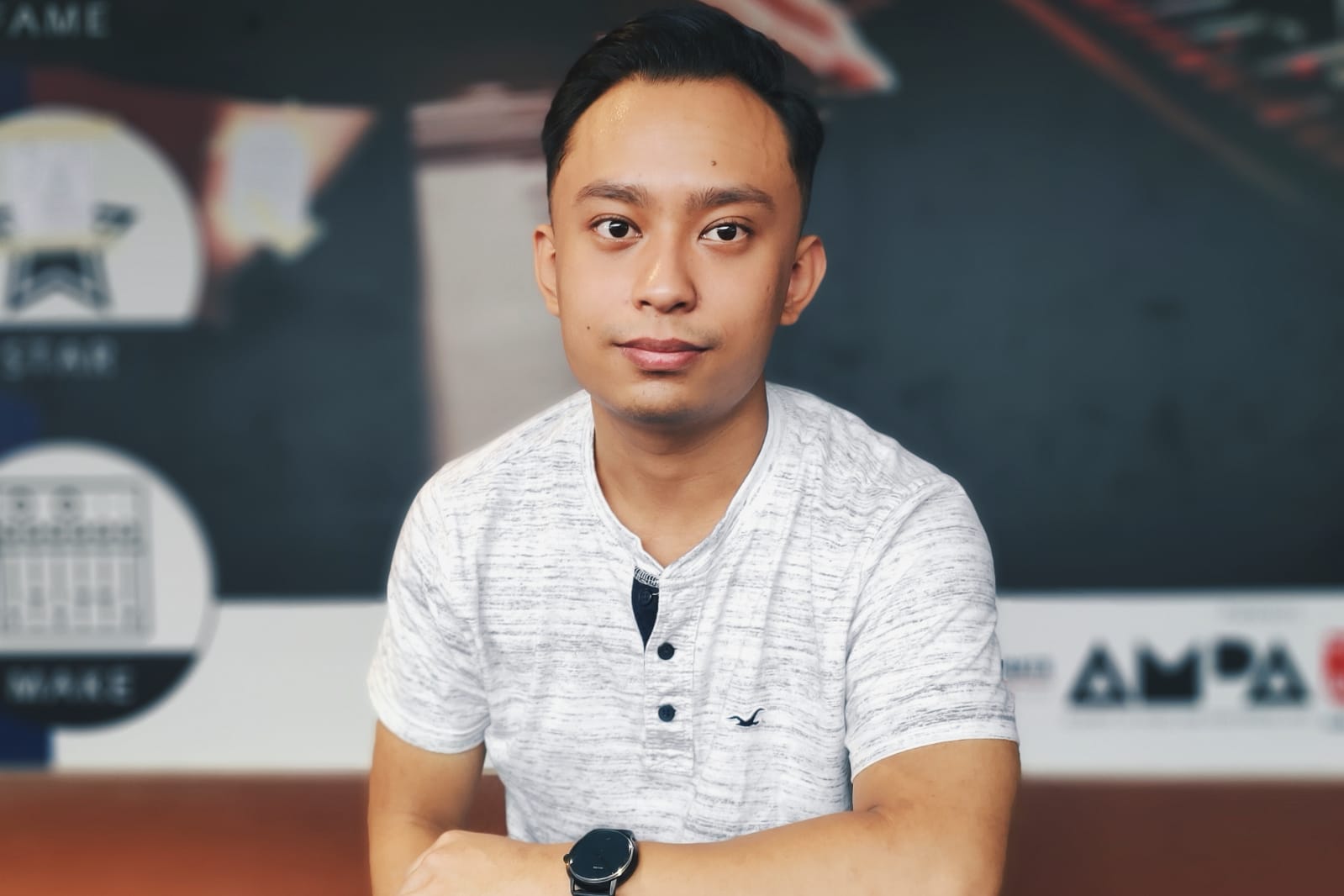 Photo by Syahindah Ishak.
Photo by Syahindah Ishak.
Fell into a drain and fractured his ankle
There are of course also times when Ageng's condition gets the better of him.
He has had more than his fair share of minor accidents over the years, mainly from falling down or bumping into things.
But his most serious accident in November 2019 left him with no choice but to use a wheelchair.
He had just finished his Friday prayers and was walking along a path with some friends.
"When I'm with my friends, I tend to not pay attention to my surroundings, unlike when I'm alone."
That was his mistake.
As they were walking, Ageng didn't realise he was approaching a big drain. He suffered a bad fall and fractured his ankle.
For more than a week he had to use a wheelchair when he was outside. At home, he walked with crutches.
That was the only period in his life he didn't dare to go out alone.
He would either have a friend or family member push him around when he went out.
Struggling to read in secondary school, couldn't keep up
But a fractured ankle was nothing compared to his secondary school years.
He found out about his condition in secondary three, so his secondary school life was tough to say the least.
Luckily, he was diagnosed during the June school holidays so he had some time to adapt to his new condition.
But when school reopened, things took a turn for the worse.
His schoolmates and teachers were informed of his disease.
Ageng recalls being moved to the front of his classroom and given laptops and magnifiers during class.
He tried learning braille too, but stopped after a while because he felt he didn't need it — using a magnifier to read, he felt, was enough for him.
But all these measures were unable to help him keep pace with his classmates in school — or even that of the school's curriculum schedule.
"My studies got worse because I couldn't really keep up with everything. I was very slow."
His school eventually sent him for counselling sessions, which didn't prove useful either.
By the time his O-Levels rolled around, Ageng was forced to drop two of the seven subjects he was supposed to take.
"During O-Levels, they brought me to a special room and I was given more time to do the papers.
I also had a transcriber so I only had to speak and he will write it for me."
Despite the extra advantages he received, Ageng didn't do as well as he'd hoped.
He only passed his English and Malay language papers and failed his other subjects.
Which was tremendously discouraging, as you might imagine, considering that prior to him losing his eyesight, he always passed all of his subjects.
Life after secondary school
After Ageng left secondary school, life was uncertain, especially with his grades.
He had no idea what he wanted to do or where he could go.
He eventually went to a Madrasah, but quit after two years because he says he didn't fit in.
Ageng was exempted from national service (NS) so he worked part-time for a few years.
But working didn't give him enough satisfaction in life, and he felt that life wasn't stable enough for him.
So in 2018, he decided to go back to school and took up a a two-year course in the Diploma in Information Technology at Kaplan Singapore.
There, he found his calling — computer science.
After graduating, he furthered his computer science interest pursuing a degree in it at Murdoch University.
There, he learnt programming and did research on software development.
"Seeing lines of codes turning into a program is interesting for me."
Working with computers was suitable for his condition too, he says.
And the course was the perfect fit for him.
Ageng uses magnifiers on his laptop to zoom into his work and has a screen reader that would narrate texts for him on his laptop.
He also activates the 'VoiceOver' function on his iPhone.
One day, he says, he hopes to be a software engineer.
Travelling to Seoul alone
Ageng tells me his experiences over the years has taught him to be more confident and independent.
"It feels great to be independent. It's a bit stressful sometimes, but overall it's great."
In December 2019, he took on what was probably his greatest challenge since developing LHON: a week-long solo trip, his first-ever, to Seoul.
He says his parents were naturally worried for him, but he went with his plan anyway.
Travelling, Ageng says, is one of his favourite things to do, and he had always wanted to travel on his own — vision loss being a minor challenge, to him hardly a hindrance, to this goal.
So how'd he do it? He says in Seoul, he used a map and took pictures of signs to find his way around the area.
On his second day, he nearly missed his bus because he got lost at the station.
Thankfully, he gained the courage to ask the locals for help and eventually found the information counter.
But despite the hiccups, Ageng had a swell time there — he even went snowboarding.
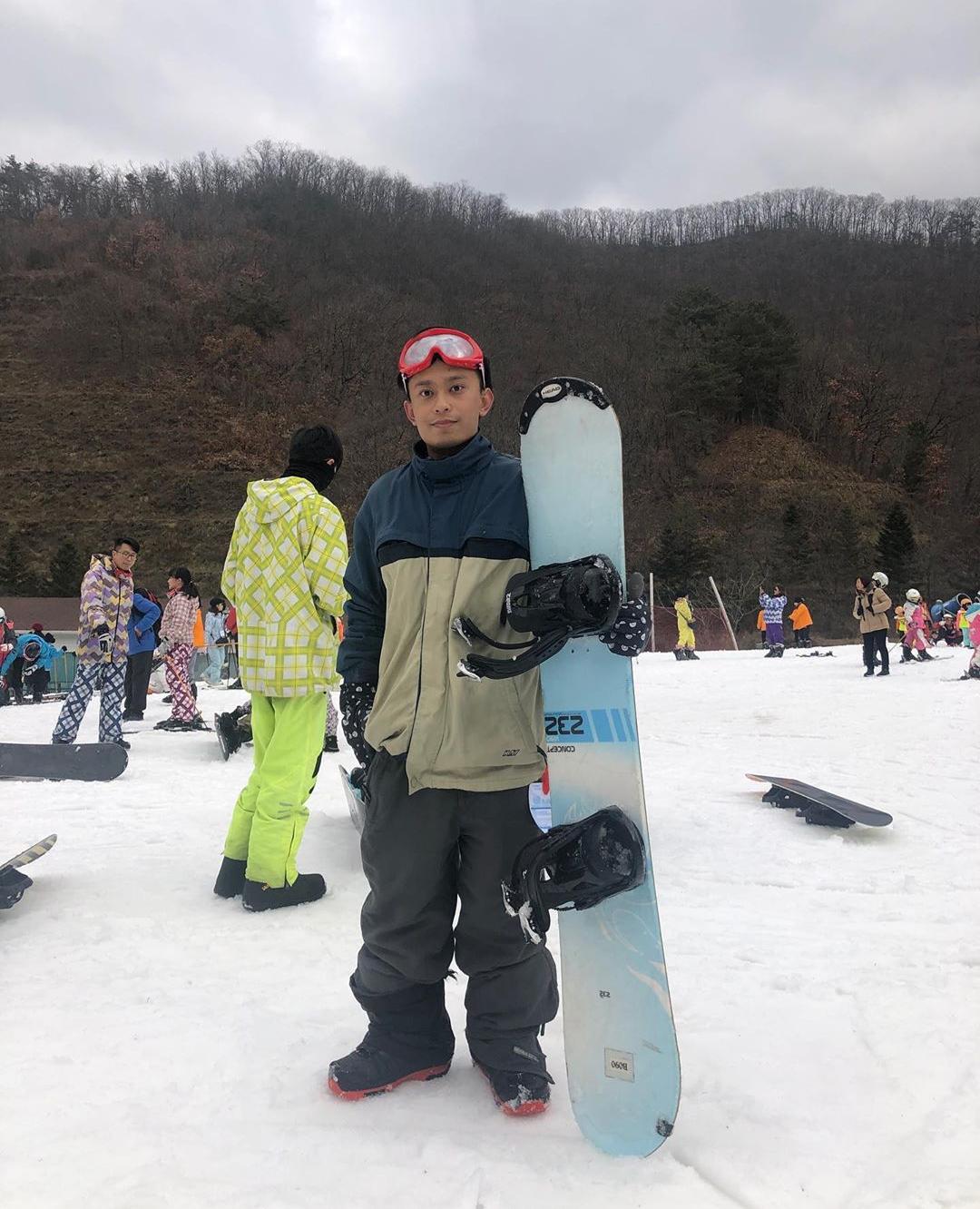 Photo courtesy of Ageng Setiyawan.
Photo courtesy of Ageng Setiyawan.
He said that although everything was blurry, he could make out silhouettes of people and managed not to bump into anybody.
"I enjoyed the trip. It was a great experience. I would go there again if I can."
Ageng already has a few more solo trips planned, Japan and Thailand being named among his future destinations.
He says he will always be up to try something new, despite his condition, and is ultimately thankful for his friends and family members who have been his main support over the years.
"I would want my vision back, though, because life will be easier," he says with a laugh. "But I'm happy with who and where I am right now."
Perspective.
Top image by Syahindah Ishak & Ageng Setiyawan.
If you like what you read, follow us on Facebook, Instagram, Twitter and Telegram to get the latest updates.
